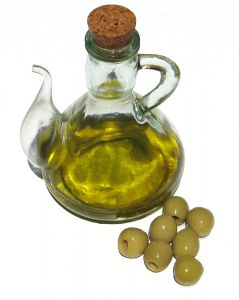Recommended
- Dr Fuhrman
- Vegan DHA
- iHerb (Great for ordering supplements, even if you're not in the US. Get $10 off your first order of $40 or more, or $5 off smaller orders, if you use coupon code GUH019)
Monounsaturated oils

In this third post in the series about cooking oils I will discuss mono-unsaturated oils (or: oils that consist primarily of mono-unsaturated fatty acids). The most prominent mono-unsaturated oil is olive oil. Another oil that is getting more popular is high-oleic sunflower/safflower oil. Usual sunflower and safflower oils are very high in polyunsaturated fatty acids, but the high-oleic varieties are made with special seeds that are about as high in monounsaturated fats as olives. See the introduction to this series for a table with the fatty acid ratios of common cooking oils.
Health benefits of mono-unsaturated oils
Monounsaturated oils are much easier to understand than polyunsaturated oils. There are no different kinds and types that you need to worry about.
You can think of monounsaturated oils as a kind of hybrid between very unstable polyunsaturated oils, and very stable saturated oils. They do not get rancid as easily as polyunsaturated oils, but they do not have the artery clogging effect of saturated fats. Mono-unsaturated oils have an anti-inflammatory effect: they are good for diseases like asthma and arthritis. They are also heart healthy because they lower LDL ("bad") cholesterol, and higher HDL ("good") cholesterol.
Health dangers of monounsaturated oils
Even though monounsaturated oils are more stable than their polyunsaturated counterparts, they do still oxidize easily. Even though olive oil is extremely rich in mono-unsaturated fatty acids, it still contains 11% of highly unstable polyunsaturated fat. Oxidized oils are dangerous to your health because they oxidize the cholesterol in your body: think of rusting arteries.
Even though mono-unsaturated fats have many health benefits, as extracted oils they are still mostly empty calories: they contain very few vitamins and no minerals. You can get those health promoting fats in a much healthier way by eating avocado's and almonds.
Recommendation
I think that if you want to consume oil, olive oil is a good choice, if you keep the following advice in mind:
- Buy extra virgin olive oil. This is the best quality olive oil, that is pressed without heat, thus preserving at least some of the antioxidants (like vitamin E) that were originally in the olives.
- Only buy olive oil that is stored in a dark bottle and still has a long shelf life.
- Always store the oil in a sealed bottle or glass jar in a dark and cool place. It is best to put it in the fridge. It will solidify, but you can just get it out of the fridge a couple of hours before you want to use it as a salad dressing, or scoop a teaspoon out of the jar if you want to use it for cooking.
- Do not overheat the oil. A good technique if you want to saute things in a little oil is to water saute: add a small amount of water to the skillet. Heat. Add a little oil. Saute as usual. This method ensures that the oils do not get too hot.
- Moderation is important. It is not healthful to regularly use two tablespoons of oil as a salad dressing.
September 27, 2006